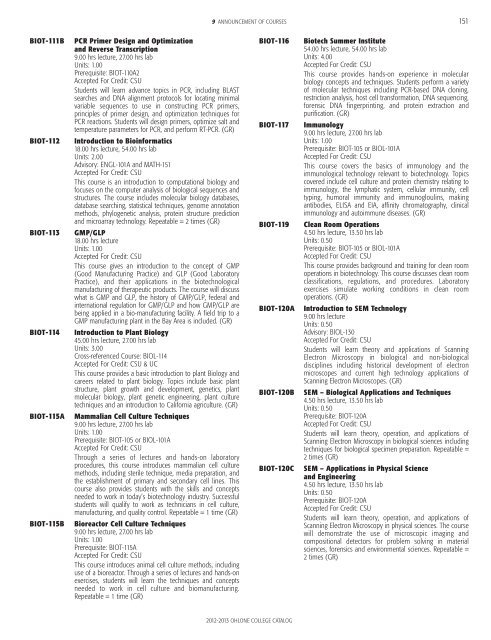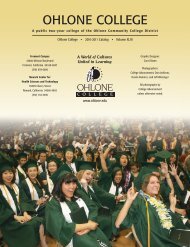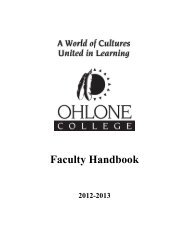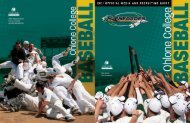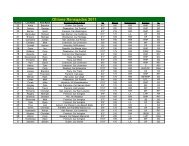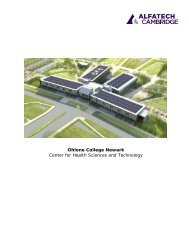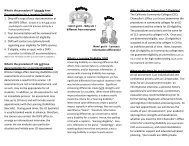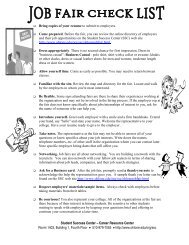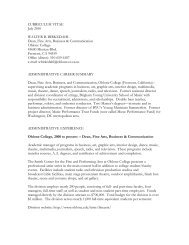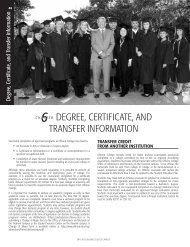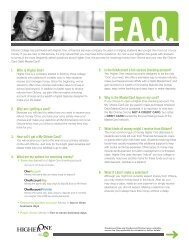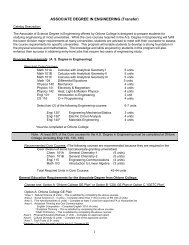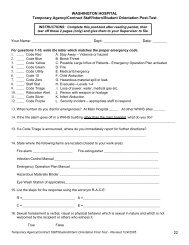2012-2013 Catalog (all pages) - Ohlone College
2012-2013 Catalog (all pages) - Ohlone College
2012-2013 Catalog (all pages) - Ohlone College
You also want an ePaper? Increase the reach of your titles
YUMPU automatically turns print PDFs into web optimized ePapers that Google loves.
9 ANNOUNCEMENT OF COURSES 151<br />
BIOT-111B<br />
BIOT-112<br />
BIOT-113<br />
BIOT-114<br />
BIOT-115A<br />
BIOT-115B<br />
PCR Primer Design and Optimization<br />
and Reverse Transcription<br />
9.00 hrs lecture, 27.00 hrs lab<br />
Units: 1.00<br />
Prerequisite: BIOT-110A2<br />
Accepted For Credit: CSU<br />
Students will learn advance topics in PCR, including BLAST<br />
searches and DNA alignment protocols for locating minimal<br />
variable sequences to use in constructing PCR primers,<br />
principles of primer design, and optimization techniques for<br />
PCR reactions. Students will design primers, optimize salt and<br />
temperature parameters for PCR, and perform RT-PCR. (GR)<br />
Introduction to Bioinformatics<br />
18.00 hrs lecture, 54.00 hrs lab<br />
Units: 2.00<br />
Advisory: ENGL-101A and MATH-151<br />
Accepted For Credit: CSU<br />
This course is an introduction to computational biology and<br />
focuses on the computer analysis of biological sequences and<br />
structures. The course includes molecular biology databases,<br />
database searching, statistical techniques, genome annotation<br />
methods, phylogenetic analysis, protein structure prediction<br />
and microarray technology. Repeatable = 2 times (GR)<br />
GMP/GLP<br />
18.00 hrs lecture<br />
Units: 1.00<br />
Accepted For Credit: CSU<br />
This course gives an introduction to the concept of GMP<br />
(Good Manufacturing Practice) and GLP (Good Laboratory<br />
Practice), and their applications in the biotechnological<br />
manufacturing of therapeutic products. The course will discuss<br />
what is GMP and GLP, the history of GMP/GLP, federal and<br />
international regulation for GMP/GLP and how GMP/GLP are<br />
being applied in a bio-manufacturing facility. A field trip to a<br />
GMP manufacturing plant in the Bay Area is included. (GR)<br />
Introduction to Plant Biology<br />
45.00 hrs lecture, 27.00 hrs lab<br />
Units: 3.00<br />
Cross-referenced Course: BIOL-114<br />
Accepted For Credit: CSU & UC<br />
This course provides a basic introduction to plant Biology and<br />
careers related to plant biology. Topics include basic plant<br />
structure, plant growth and development, genetics, plant<br />
molecular biology, plant genetic engineering, plant culture<br />
techniques and an introduction to California agriculture. (GR)<br />
Mammalian Cell Culture Techniques<br />
9.00 hrs lecture, 27.00 hrs lab<br />
Units: 1.00<br />
Prerequisite: BIOT-105 or BIOL-101A<br />
Accepted For Credit: CSU<br />
Through a series of lectures and hands-on laboratory<br />
procedures, this course introduces mammalian cell culture<br />
methods, including sterile technique, media preparation, and<br />
the establishment of primary and secondary cell lines. This<br />
course also provides students with the skills and concepts<br />
needed to work in today’s biotechnology industry. Successful<br />
students will qualify to work as technicians in cell culture,<br />
manufacturing, and quality control. Repeatable = 1 time (GR)<br />
Bioreactor Cell Culture Techniques<br />
9.00 hrs lecture, 27.00 hrs lab<br />
Units: 1.00<br />
Prerequisite: BIOT-115A<br />
Accepted For Credit: CSU<br />
This course introduces animal cell culture methods, including<br />
use of a bioreactor. Through a series of lectures and hands-on<br />
exercises, students will learn the techniques and concepts<br />
needed to work in cell culture and biomanufacturing.<br />
Repeatable = 1 time (GR)<br />
BIOT-116<br />
BIOT-117<br />
BIOT-119<br />
BIOT-120A<br />
BIOT-120B<br />
BIOT-120C<br />
Biotech Summer Institute<br />
54.00 hrs lecture, 54.00 hrs lab<br />
Units: 4.00<br />
Accepted For Credit: CSU<br />
This course provides hands-on experience in molecular<br />
biology concepts and techniques. Students perform a variety<br />
of molecular techniques including PCR-based DNA cloning,<br />
restriction analysis, host cell transformation, DNA sequencing,<br />
forensic DNA fingerprinting, and protein extraction and<br />
purification. (GR)<br />
Immunology<br />
9.00 hrs lecture, 27.00 hrs lab<br />
Units: 1.00<br />
Prerequisite: BIOT-105 or BIOL-101A<br />
Accepted For Credit: CSU<br />
This course covers the basics of immunology and the<br />
immunological technology relevant to biotechnology. Topics<br />
covered include cell culture and protein chemistry relating to<br />
immunology, the lymphatic system, cellular immunity, cell<br />
typing, humoral immunity and immunogloulins, making<br />
antibodies, ELISA and EIA, affinity chromatography, clinical<br />
immunology and autoimmune diseases. (GR)<br />
Clean Room Operations<br />
4.50 hrs lecture, 13.50 hrs lab<br />
Units: 0.50<br />
Prerequisite: BIOT-105 or BIOL-101A<br />
Accepted For Credit: CSU<br />
This course provides background and training for clean room<br />
operations in biotechnology. This course discusses clean room<br />
classifications, regulations, and procedures. Laboratory<br />
exercises simulate working conditions in clean room<br />
operations. (GR)<br />
Introduction to SEM Technology<br />
9.00 hrs lecture<br />
Units: 0.50<br />
Advisory: BIOL-130<br />
Accepted For Credit: CSU<br />
Students will learn theory and applications of Scanning<br />
Electron Microscopy in biological and non-biological<br />
disciplines including historical development of electron<br />
microscopes and current high technology applications of<br />
Scanning Electron Microscopes. (GR)<br />
SEM – Biological Applications and Techniques<br />
4.50 hrs lecture, 13.50 hrs lab<br />
Units: 0.50<br />
Prerequisite: BIOT-120A<br />
Accepted For Credit: CSU<br />
Students will learn theory, operation, and applications of<br />
Scanning Electron Microscopy in biological sciences including<br />
techniques for biological specimen preparation. Repeatable =<br />
2 times (GR)<br />
SEM – Applications in Physical Science<br />
and Engineering<br />
4.50 hrs lecture, 13.50 hrs lab<br />
Units: 0.50<br />
Prerequisite: BIOT-120A<br />
Accepted For Credit: CSU<br />
Students will learn theory, operation, and applications of<br />
Scanning Electron Microscopy in physical sciences. The course<br />
will demonstrate the use of microscopic imaging and<br />
compositional detectors for problem solving in material<br />
sciences, forensics and environmental sciences. Repeatable =<br />
2 times (GR)<br />
<strong>2012</strong>-<strong>2013</strong> OHLONE COLLEGE CATALOG


